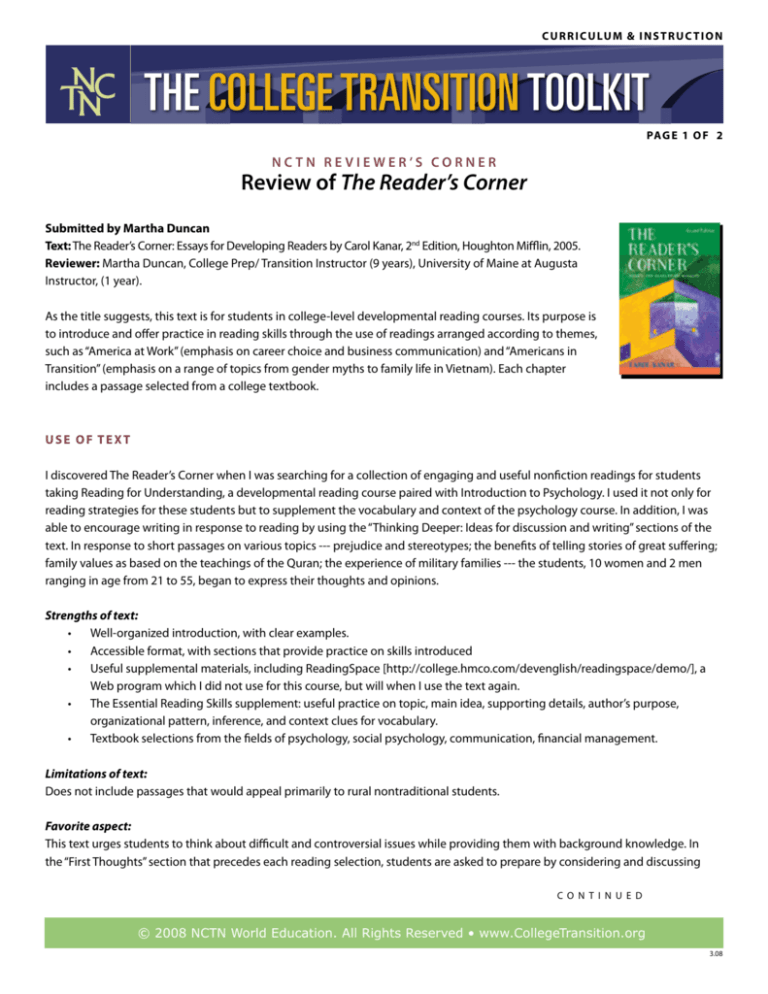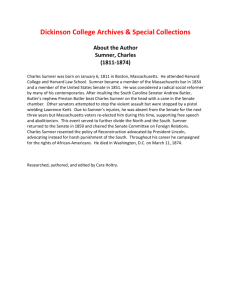
C u r r i c u lu m & i n s t r u c t i o n
NATIONAL COLLEGE
TRANSITION NETWORK
The College Transition Toolkit
A PART OF
WORLD EDUCATION, INC.
pag e 1 o f 2
N C TN R e v i e w e r ’ s C o r n e r
Review of The Reader’s Corner
Submitted by Martha Duncan
Text: The Reader’s Corner: Essays for Developing Readers by Carol Kanar, 2nd Edition, Houghton Mifflin, 2005.
Reviewer: Martha Duncan, College Prep/ Transition Instructor (9 years), University of Maine at Augusta
Instructor, (1 year).
As the title suggests, this text is for students in college-level developmental reading courses. Its purpose is
to introduce and offer practice in reading skills through the use of readings arranged according to themes,
such as “America at Work” (emphasis on career choice and business communication) and “Americans in
Transition” (emphasis on a range of topics from gender myths to family life in Vietnam). Each chapter
includes a passage selected from a college textbook.
Use of text
I discovered The Reader’s Corner when I was searching for a collection of engaging and useful nonfiction readings for students
taking Reading for Understanding, a developmental reading course paired with Introduction to Psychology. I used it not only for
reading strategies for these students but to supplement the vocabulary and context of the psychology course. In addition, I was
able to encourage writing in response to reading by using the “Thinking Deeper: Ideas for discussion and writing” sections of the
text. In response to short passages on various topics --- prejudice and stereotypes; the benefits of telling stories of great suffering;
family values as based on the teachings of the Quran; the experience of military families --- the students, 10 women and 2 men
ranging in age from 21 to 55, began to express their thoughts and opinions.
Strengths of text:
• Well-organized introduction, with clear examples.
• Accessible format, with sections that provide practice on skills introduced
•Useful supplemental materials, including ReadingSpace [http://college.hmco.com/devenglish/readingspace/demo/], a
Web program which I did not use for this course, but will when I use the text again.
• The Essential Reading Skills supplement: useful practice on topic, main idea, supporting details, author’s purpose,
organizational pattern, inference, and context clues for vocabulary.
• Textbook selections from the fields of psychology, social psychology, communication, financial management.
Limitations of text:
Does not include passages that would appeal primarily to rural nontraditional students.
Favorite aspect:
This text urges students to think about difficult and controversial issues while providing them with background knowledge. In
the “First Thoughts” section that precedes each reading selection, students are asked to prepare by considering and discussing
c o ntin u ed
© 2008 NCTN World Education. All Rights Reserved • www.CollegeTransition.org
3.08
The College Transition Toolkit
pag e 2 o f 2
questions related to the topic; for example, “What do you know about the teachings in the Quran?” and “What does the term ‘racial
profiling’ mean?” Some examples of questions from the “Thinking Deeper” sections that follow the readings are:
“Do religious teachings play a role in your family life?”
“Is there an action taken by the U.S. in the Iraq war that you support or do not support?”
“What evidence of gender stereotyping have you seen, either in your early school years or in the present?”
To respond to such questions, students had to ask more questions and seek out more information, sometimes in class, sometimes
with family and friends. While the sections on vocabulary and comprehension reinforce strategies, “First Thoughts” and “Thinking
Deeper” provide opportunities for students to make connections between their own lives and the larger world.
About the Reviewer
Background
• B.A. in Human Services Advocacy from University of Massachusetts College of Public and Community Service (1983)
• M.Ed. in Adult and Community Education from Lesley College (1989)
Teaching History
• 1982–1987 University of Massachusetts: Teaching Assistant, Assessment Entry for Academic Programs; Co-Teacher, “The
Theory and Practice of Adult Education;” Jackson/Mann Adult Education, Brighton, Massachusetts: Adult Basic Education.
• 1987–1993 Brooklin, Maine Elementary School: K-8 Remedial Reading and Special Education.
• 1993–Present Sumner Adult Education Program: Instructor and Curriculum Coordinator in Adult Basic Education, Adult
Diploma, GED, ESOL and College Preparation; University of Maine at Augusta: Instructor in Developmental Studies, one
semester in Basic Writing, one semester in Reading for Understanding.
• 2000–Present Instructor and Coordinator in Sumner Adult Education College Transition Project model funded by Nellie
Mae Education Foundation: Reading for College, Writing for College, Math for College.
© 2008 NCTN World Education. All Rights Reserved • www.CollegeTransition.org
3.08











